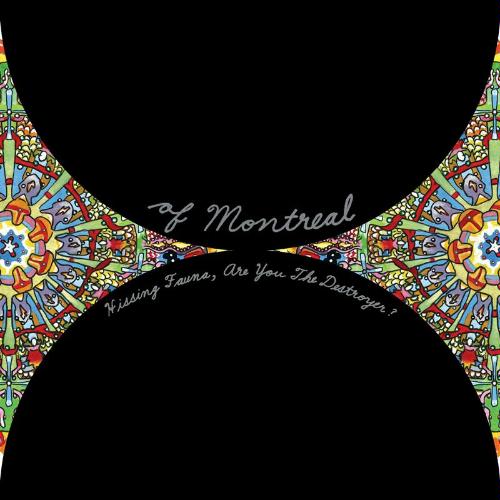Of Montreal - Hissing Fauna, Are You the Destroyer?

Profound humanity radiates from Kevin Barnes, lead man and intellectual dynamo of Of Montreal. The impressive gamut of albums by Of Montreal reads like epic poetry: as Barnes’ character matures, his music responds with an increasingly intricate vocabulary of human experience. The Of Montreal project functions as an emotional outlet for Barnes, whose personal life inspires powerful themes such as suicidal depression, psychedelic ecstasy, romance, and graphic sexuality. Often subtextual references to Classical mythology, philosophy, and literature counterpoint major themes, and add a level of intellectual depth to an assertively unique pop aesthetic.
Hissing Fauna, Are You the Destroyer opens with the line “we just want to emote til we’re dead,” a tongue-in-cheek meaning-of-life sentiment which makes fellow nihilists smirk. Barnes wrote and recorded Hissing Fauna in Norway, where he sequestered himself following the collapse of his marriage. “Heimdalsgate Like A Promethean Curse” laments the capricious nature of neuro-chemical imbalance to send one spiraling into depression unexpectedly and without conscious recourse (“come on mood shift, shift back to good again, come on be a friend”). Wallowing in the depths of identity crisis, Barnes looks to religion to pick him up, but cynically exclaims:
Guess it would be nice to give my heart to a god,
But which one which one do I choose?
All the churches fill with losers psycho or confused
I just want to hold the divine in mine and forget all of the beauty’s wasted.
Barnes hits rock bottom in “The Past is a Grotesque Animal,” an epic 12 minute personal deconstruction and the album’s central pivot, wherein Barnes manually pieces together his shattered identity, emerging at the end transformed into his self-assessed glam-pop alter ego Georgie Fruit. The album completes with the lyrical and gorgeous “We Were Born Mutants Again with Leafling.” Leafling references Barnes’ newborn daughter Alabee, whose birth causes her parents to renege on their separation in the interest of their child. The last words of the album appear to be a cry of repentance; Barnes admits wrong and humbly asks for reconciliation:
Sometimes we’re not legible,
But we’re the same strange animal,
Let them say our love is peculiar don’t care.
There’s only now no ever after,
We won’t let this end in disaster,
You are my twin no I will never go there.